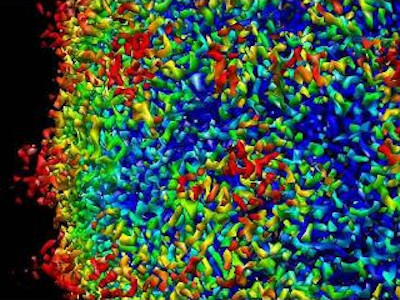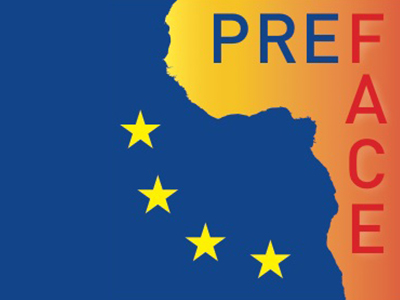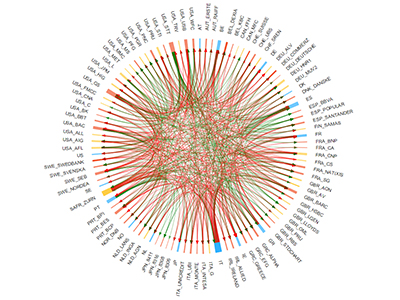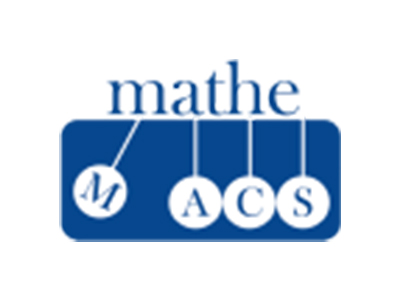Complexity

Research Institute for Complexity
Science of complex economic, human and natural systems
The transdisciplinary study of complex systems offers innovative solutions to outstanding scientific questions and global societal challenges. It requires the work and contributions of mathematicians, computer and data scientists, physicists, linguists, historians, social scientists and researchers in the fields of humanities, economy, ecology and climatology. In complex systems, growth patterns and final structures are not predictable: no design is possible from a priori knowledge but design possibilties are experimented: it requires evolutionary algorithms to optimize complex systems.
Pattern identification and the study of dynamic interactions in complex systems allow the development of models and simulation tools that fit stylized facts and can be applied in a variety of fields, ranging from climate projections to the implementation of risk management and mitigation strategies and the understanding of behaviours in socio-economic, and natural systems.
Keywords
Advanced and smart materials, Behavioural models, Big data, Climate science, Complex networks, Computational models, Computing, Data mining, Modelling, simulation and forecasting tools, Network modelling, Pattern identification and analysis, Risk assessment, Risk management, Smart cities and, communities, Systemic risk
Coordinator
Research facilitators
Members
High-impact and award-winning projects
ECOMOBILITY - Ecological supporting for traffic management in coastal areas by using an intelligent system
Mortgage loans in Europe are equivalent to around 46% of the European Union’s GDP. Facilitating the transition to Green Mortgages is crucial to the realisation of a climate-neutral economy. Likewise, consumer expectations and financial sector best practices must meet. The mortgage industry is an essential player in efforts to tackle climate change through its funding of the home renovation programmes needed to improve the energy performance of the EU’s building stock. Since its inception in 2015, the EU Horizon 2020 funded Energy Efficient Mortgages Initiative (EEMI) has been the catalyst for the growth of a new, integrated, multi-stakeholder energy efficient mortgage ecosystem. The EEMI seeks to introduce a greener, more sustainability focused means of buying, renovating and living in our homes.
Website
Researcher: Andrea Gambaro
Duration: 01/01/2018 - 30/06/2019
BIORIMA - BIOmaterial RIsk MAnagement
The project BIORIMA aims to develop an integrated risk management (IRM) framework for nano-biomaterials (NBM) used in Advanced Therapeutic Medicinal Products (ATMP) and Medical Devices (MD). The BIORIMA RM framework is a structure upon which the validated tools and methods for materials, exposure,hazard and risk identification/assessment and management are allocated plus a rationale for selecting and using them to manage and reduce the risk for specific NBM used in ATMP and MD. BIORIMA will deliver a web-based Decision Support System to help users, especially SME, evaluate the risk/benefit profile of their NBM products and help to shorten the time to market for NBM products.
Project website / EU Cordis database
Researcher: Antonio Marcomini
Duration: 01/11/2017 - 31/10/2021
Funding: Horizon 2020 Industrial Leadership - Leadership in enabling and industrial technologies - Advanced materials
EeMAP - Energy efficient Mortgages Action Plan
In the EU, buildings are responsible for 40% of total energy consumption and 36% of CO2 emissions. By improving the energy efficiency (EE) of buildings, the EU's total energy consumption could be reduced by 5-6% and CO2 emissions by 5%. Considering that the building stock constitutes the largest single energy consumer in the EU, and that the value of the European mortgage market is equal to 53% of EU’s GDP, there is huge potential to bridge financial innovation and the EE world and to unlock the benefits of mortgage financing to support EE to the benefit of all.The EeMAP Project intends to deliver a standardised framework based on a market benchmark to stimulate EE investment by households in the EU’s housing stock by way of a private banking financing mechanism. Three key outputs will be: a framework for a building energy passport, recording the EE history of a property by recognising the improvements made; a framework that can integrate the "green value" of a property through EE and collected market data; the framework for an EE mortgage product. Accordingly, EE investment will become financially viable, as market transparency will be improved. The Project will create synergies in the mortgage and covered bond value chain, delivering a virtuous circle between lenders, borrowers and investors from the origination of the energy efficient mortgage to the pooling of EE collateral for the purpose of energy efficient covered bonds. EeMAP has long-term potential to drive housing markets across Europe in a sustainable manner and encourage significant energy reductions in line with the EU’s aspirations and global climate change demands. Concretely, issuing 35,000 green mortgages a year can achieve savings of 88 GWh per annum.
Project website / EU Cordis database
Researcher: Monica Billio
Duration: 01/05/2017 - 31/03/2019
Funding: Horizon 2020 Societal Challeges - Secure, clean and efficient energy
Smart manufacturing for EU Growth
"MAKERS -Smart Manufacturing for EU Growth and Prosperity" brings together leaders from business, academia and policy to study issues related to the drivers and dynamics of sustaining the competitiveness of EU manufacturing sectors.
The project’s innovative research, training and mobility activities address key concerns related to the historic opportunity for the EU to lead a manufacturing renaissance that not only upgrades existing manufacturing competences but, more importantly, develops new technological capabilities across EU regions to support regional industrial resilience for more distributed and sustainable socioeconomic growth and prosperity.
This project is funded by Horizon 2020 - Research and innovation Staff Exchange (RISE) and is developed at the Ca’ Foscari Economics Department.
Website
Researcher: Mario Volpe
Duration: 01/01/2016 - 31/12/2018
PREFACE - Predicting Tropical Atlantic climate and its impacts
PREFACE - Enhancing prediction of Tropical Atlantic climate and its impacts - is a climate change FP7 project with 28 partners across 18 countries in Europe and Africa, and 3 associate partners directly involved in the sustainable management of the three Eastern boundary large marine ecosystems of the Tropical Atlantic.
Ca’ Foscari leads the work package "Statistical methods to assess and improve forecast of Tropical Atlantic variability (TAV)".
Project website / EU Cordis database
Researcher: Angelo Rubino
Duration: 01/11/2013 - 31/10/2017
Funding: Seventh Framework Programme (FP7)
SYRTO - Linkages and vulnerabilities of the financial system
The FP7 project SYRTO explores the relationships between Sovereigns – Banks and other Financial Intermediaries (BFIs) – Corporations of the European Union the group aims to realize a research center in order to give a formal structure to the mission, objectives and results of the SYRTO project.
This center will use the methodologies developed by the team to produce indicators about the state of the markets, corporates, banks and financial intermediaries, and sovereigns, both through the publication of periodic reports, and through risk indicators.
Project website / EU Cordis database
Researcher: Monica Billio
Duration: 01/03/2013 - 29/02/2016
Funding: Seventh Framework Programme (FP7)
Developing mathematical tools of information and dynamic-systems theories
A consortium of six European partners have joined forces to carry out original research on complex systems through a common project that aims to develop a mathematical theory of complex multilevel systems and their dynamics.
In addition to considering systems with respect to a given level structure, as is natural in certain applications or dictated by available data, the MATHEMACS project (FP7) has the unique goal of identifying additional meaningful levels for understanding multi-level systems.
This is achieved through a general formulation based on the mathematical tools of information and dynamic-systems theories.
Website
Researcher: Massimo Warglien
Duration: 02/10/2012 - 30/09/2015







